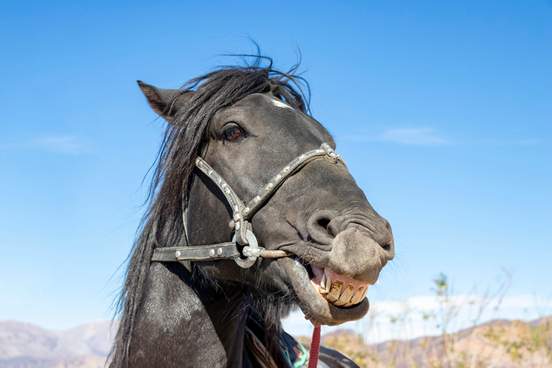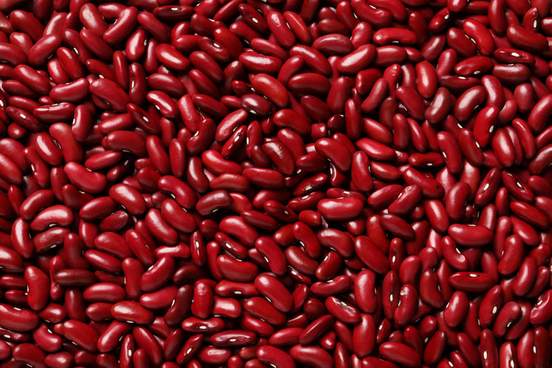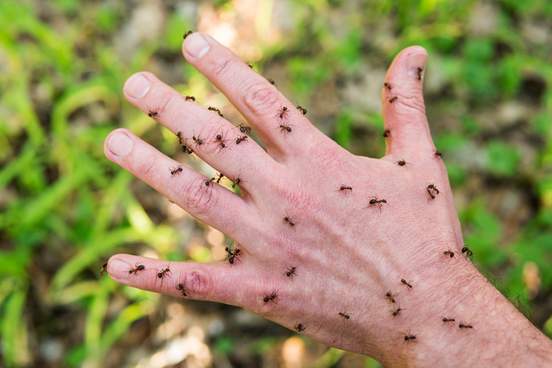
Nidifugous
Definition:
leaving the nest soon after hatching
Degree of Usefulness:
This word’s usefulness appears to vary with the economic climate.
Some Trivia:
This word is typically applied to birds, but you can use it for your teenaged children.

Undusous
Definition:
“full of surges and waves” (Henry Cockeram, An English Dictionaries, 1623)
Degree of Usefulness:
Not very useful, but lovely to know.
Some Trivia:
This word appears to be consistently unused, outside of Cockeram’s dictionary.

Gramaungere
Definition:
“a great meal” (The Oxford English Dictionary)
Degree of Usefulness:
Varies, depending on your appetites and tastes.
Some Trivia:
This word, which appears in the world’s most august dictionary, is accompanied by a curious editorial note, which reads “Not from the original French, which has ‘do you think you can eat up all the pagans by yourselves?’”

Gaudiloquent
Definition:
“speaking with joy” (Elisha Coles, An English Dictionary, 1677)
Degree of Usefulness:
Since when do words about joy need to be useful?
Some Trivia:
This word probably shares a root with gaudy: both are thought to come from the Latin gaudium, “joy.”

Jumentous
Definition:
Resembling the urine of a horse, in odor.
Degree of Usefulness:
We hope this word is never very useful.
Some Trivia:
The fact that this word exists should be trivia enough for you.

Gardyloo
Definition:
used in Edinburgh as a warning cry when it was customary to throw slops from the windows into the streets
Degree of Usefulness:
Useful whenever you’re throwing liquid out a window.
Some Trivia:
In early use, in the 18th century, the word was more often used when throwing out one’s chamber pot, as opposed to kitchen slops.

Antapology
Definition:
“A response to an apology” (Webster’s New International Dictionary, 2nd Ed., 1934)
Degree of Usefulness:
That depends on how common apologies are in your life.
Some Trivia:
This word appears to most often occur in religious contexts.

Birl
Definition:
to cause (a floating log) to rotate by treading
Degree of Usefulness:
The next time you find yourself spinning on a floating log you’re going to thank us for this.
Some Trivia:
This word is thought to be imitative in origin.

Bovarism
Definition:
a conception of oneself as other than one is to the extent that one's general behavior is conditioned or dominated by the conception
Degree of Usefulness:
We all know someone whose idea of themself does not quite match reality.
Some Trivia:
The word comes from Madame Bovary, the principal character in the 19th-century novel Madame Bovary, by Gustave Flaubert.

Bromhidrosis
Definition:
foul-smelling sweat
Degree of Usefulness:
Infrequent, we trust.
Some Trivia:
If you need a word for “causing sweating,” you’re in luck, as English has a bunch of them, including hidrotic, sudorific, and diaphoretic.

Epistemophilia
Definition:
love of knowledge; specifically : excessive striving for or preoccupation with knowledge
Degree of Usefulness:
Perfect for describing the smarty-pants in your life.
Some Trivia:
The philia- part of this word is related to -phile, the combining form that word means “one that loves,” and that comes up in numerous other English words.

Fabiform
Definition:
shaped like a bean
Degree of Usefulness:
Surprisingly useful! Good for describing many kinds of legumes and people.
Some Trivia:
Fabiform is a combination of the Latin word faba (meaning “bean”) and the English combining form -iform.

Jobbernowl
Definition:
nincompoop
Degree of Usefulness:
Unfortunately high.
Some Trivia:
This charming synonym for nincompoop is thought to come from the Middle English word jobard, meaning “blockhead,” which itself is from the Old Testament name Job.

Horrisonant
Definition:
“Sounding dreadfully” (Webster’s New International Dictionary, 2nd Ed., 1934)
Degree of Usefulness:
Can be used instead of cacophonous.
Some Trivia:
This word is about as well known as its opposite, mellisonant, “pleasing to the ear.”

Hygeiolatry
Definition:
“Worship of health; excessive devotion to hygiene.” (The Oxford English Dictionary)
Degree of Usefulness:
That depends on how clean your roommates are.
Some Trivia:
Very close to hagiolatry, the worship of saints, but still a totally different word.

Hypobulia
Definition:
lowered ability to make decisions or to act
Degree of Usefulness:
We can’t quite say…
Some Trivia:
Hyperbulia is sometimes used of the condition of having a bit too much drive.

Ingravescence
Definition:
the state of becoming progressively more severe
Degree of Usefulness:
That depends on how you feel.
Some Trivia:
This is a very serious medical word. Please do not misuse it.

Mushfaker
Definition:
“an itinerant umbrella repairer” (The Oxford English Dictionary)
Degree of Usefulness:
Low, but when you finally meet an itinerant umbrella repairer think how happy you will be.
Some Trivia:
Mush is slang for umbrella, shortened from mushroom.

Lestobiosis
Definition:
a relationship (as between species) in which covert thievery replaces aggressive plundering
Degree of Usefulness:
Very useful, if you are prone to nicking small items that are not yours.
Some Trivia:
Lestobiosis is a form of cleptobiosis, which is “a mutual relation in which members of one species (as of ants) habitually steal food from another.”

Lurdane
Definition:
a lazy stupid person
Degree of Usefulness:
Most useful during one’s time at work.
Some Trivia:
Lurdane can be traced to the Latin luridus, meaning “lurid.”

Mycophagist
Definition:
one that eats fungi (such as mushrooms)
Degree of Usefulness:
Perfect for the mushroom-lover in your life.
Some Trivia:
Closely related to the mycophile: “a devotee of mushrooms; especially, one whose hobby is hunting wild edible mushrooms.”

Cacafuego
Definition:
“a Spanish word signifying shitefire” (Edmund Phillips, The New World of English Words, 1658)
Degree of Usefulness:
Very useful, if you know anyone who is prone to bragging.
Some Trivia:
Cacafuego was the nickname given to a Spanish ship, captured by Sir Francis Drake in the 16th century. The ship’s actual name was Nuestra Señora de la Concepción.

Opsigamy
Definition:
"marriage at an advanced age" (Webster’s New International Dictionary, 2nd Ed., 1934)
Degree of Usefulness:
Especially useful for those who know you're never too old to fall in love.
Some Trivia:
Should not be confused with opsimathy, which is “education late in life.”

Proctalgia
Definition:
rectal pain
Degree of Usefulness:
That is none of our business.
Some Trivia:
Proctalgia and nostalgia share a root, the Greek word algos, “pain.”

Struthious
Definition:
of, relating to, or resembling the ostrich
Degree of Usefulness:
Zookeepers love this word.
Some Trivia:
Struthious may also be applied to other ratite birds, “any of various mostly flightless birds (such as an ostrich, rhea, emu, moa, or kiwi) with small or rudimentary wings and no keel on the sternum that are probably of polyphyletic origin and are assigned to a number of different orders.”

Unasinous
Definition:
“Agreeing in stupidity” (The Oxford English Dictionary)
Degree of Usefulness:
That’s for you to decide…
Some Trivia:
Somehow this word never really caught on, despite it obviously being quite useful. It does not appear to have been used beyond the 17th century.

Xenium
Definition:
a present given among the ancient Greeks and Romans to a guest or stranger and especially to a foreign ambassador
Degree of Usefulness:
Depends on how many guests (or foreign ambassadors) you have visiting you.
Some Trivia:
If you have multiple gifts to give to guests or strangers the plural form of the word is xenia.

Estivate
Definition:
to spend the summer usually at one place
Degree of Usefulness:
Seasonal.
Some Trivia:
When used in a strict zoological sense, estivate means “to pass the summer in a state of torpor or dormancy.”

Afterwit
Definition:
wisdom or perception that comes after it can be of use
Degree of Usefulness:
Unfortunately useful.
Some Trivia:
Similar to esprit de l’escalier, which means “repartee thought of only too late, on the way home.”

Agnification
Definition:
the representation (as in painting) of persons as sheep or lambs
Degree of Usefulness:
Limited, unless one is using it in a figurative manner.
Some Trivia:
Agnification was most often found in religious contexts when the word first began to be used in English in the middle of the 19th century.

Amethodist
Definition:
“one without method; a quack” (Webster’s New International Dictionary, 2nd Ed., 1934)
Degree of Usefulness:
Highly useful!
Some Trivia:
Although this word seems to have been mainly applied to doctors in the past, it can also be used of those in any profession who seem to follow no method.

Throttlebottom
Definition:
an innocuously inept and futile person in public office
Degree of Usefulness:
Even if it is useless the word is so fun to say that you will find opportunities to use it.
Some Trivia:
The word comes from the name Alexander Throttlebottom, a character in the 1931 musical comedy Of Thee I Sing.

Testiculous
Definition:
“Testiculous, that hath great Cods” (Nathaniel Bailey, An Universal Etymological English Dictionary, 1721)
Degree of Usefulness:
We have nothing to say on this matter.
Some Trivia:
The cods that Bailey refers to above are today better known as testicles.

Barleyhood
Definition:
“bad temper caused by drinking” (Webster’s New International Dictionary, 2nd Ed., 1934)
Degree of Usefulness:
Mostly applicable on weekends.
Some Trivia:
This word may be spelled in various ways, including barlichood and barlickhood.

Eye-servant
Definition:
one that attends to duty only when watched
Degree of Usefulness:
That depends on whether you are management or not.
Some Trivia:
We label eye-servant as archaic, because people do not use this word much anymore, which is probably because there are fewer people who only work when they’re being watched these days.

Cepivorous
Definition:
Onion-eating
Degree of Usefulness:
Very useful, if you meet someone who likes to eat onions.
Some Trivia:
Someone who is overly cepivorous may also be described as alliaceous, “having the smell of garlic or onions.”

Dolorifuge
Definition:
something that banishes or mitigates grief
Degree of Usefulness:
We hope it's infrequently needed but easily applicable in such times.
Some Trivia:
Should not be confused with doloriferous, which means “producing pain.”

Cogitabund
Definition:
given to deep thought : having the appearance of being in deep meditation
Degree of Usefulness:
Useful for describing your state when you’re lost in thought.
Some Trivia:
To cogitate is “to ponder or meditate on usually intently.”

Euonym
Definition:
a name well suited to the person, place, or thing named
Degree of Usefulness:
Highly useful when you meet a lawyer named Lawrence.
Some Trivia:
The related adjective is euonymous, “well named.”

Hindermate
Definition:
“A companion who is a hindrance.” (The Oxford English Dictionary)
Degree of Usefulness:
Varies with the rate of marriage.
Some Trivia:
Not a common word; neither is its antonym, helpmeet.

Gigman
Definition:
“one who worships smug respectability as the great object of life”
(Webster’s New International Dictionary, 2nd Ed., 1934)
Degree of Usefulness:
Perfect for the snobby neighbor who you don’t like very much.
Some Trivia:
The gig portion of this word refers to “a light 2-wheeled one-horse carriage,” a type of vehicle once much in fashion with certain classes of society.

Eudaemonic
Definition:
producing happiness
Degree of Usefulness:
We hope it is very useful.
Some Trivia:
This word has an antonym, which is infelicific: “productive of unhappiness.”

Exsibilate
Definition:
“To reject with or as with hissing.” (Webster’s New International Dictionary, 2nd Ed., 1934)
Degree of Usefulness:
Very useful when attending certain concerts or plays.
Some Trivia:
This word comes from the Latin sibilare (“to hiss, whistle”), which is also the source of sibilant.

Obsibilate
Definition:
“to make a whistling noise, as Trees stirred with winds” (Thomas Blount, Glossographia, 1661)
Degree of Usefulness:
Perfect for that mid-Autumn walk in the woods.
Some Trivia:
This word comes from the Latin sibilare, meaning “to hiss, whistle.”

Formication
Definition:
an abnormal sensation resembling that made by insects creeping in or on the skin
Degree of Usefulness:
Useful for people who enjoy scary movies.
Some Trivia:
This comes to English from the Latin word for “ant”: formica.

Flibbertigibbet
Definition:
a silly flighty person
Degree of Usefulness:
Useful; it’s nice to have a word that is mildly opprobrious, without sounding too mean.
Some Trivia:
The adjective form of this word, believe it or not, is flibbertigibbety.

Grangousier
Definition:
“one with a gullet of vast size, who will swallow anything”
(Webster’s New International Dictionary, 2nd Ed., 1934)
Degree of Usefulness:
Perfect for family dinners.
Some Trivia:
Grangousier was the name of a character in Gargantua and Pantagruel, the 16th century work by François Rabelais.

Bucculent
Definition:
“blub-cheeked, wide-mouthed” (Thomas Blount, Glossographia, 1661)
Degree of Usefulness:
Useful at meal times, with certain family members.
Some Trivia:
The word buccal means “of, relating to, near, involving, or supplying a cheek.”

Doundrins
Definition:
“Afternoon drinkings” (Nathan Bailey, An universal etymological English dictionary, 1753)
Degree of Usefulness:
We are a nonjudgmental dictionary, insofar as both your language use and drinking habits are concerned.
Some Trivia:
The fact that few, if any, dictionaries since the 18th century have defined this word does not mean that people have stopped drinking in the afternoon; it only means that we’ve stopped using this word.

Hadiwist
Definition:
“vain regret” (The Oxford English Dictionary)
Degree of Usefulness:
See previous slide.
Some Trivia:
This word becomes increasingly useful as one ages.





